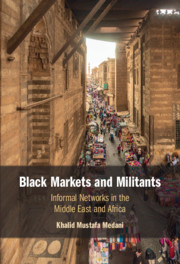Crossref Citations
This Book has been
cited by the following publications. This list is generated based on data provided by Crossref.
Lynch, Marc
2022.
The Future of Islamism through the Lens of the Past.
Religions,
Vol. 13,
Issue. 2,
p.
113.
Umezurike, Uchechukwu Peter
2023.
“‘Everything in this new world, a wound’: hospitality and violence in Jamila Osman’s poetry.”.
Journal of the African Literature Association,
Vol. 17,
Issue. 3,
p.
422.
Verhoeven, Harry
2023.
Surviving revolution and democratisation: the Sudan armed forces, state fragility and security competition.
The Journal of Modern African Studies,
Vol. 61,
Issue. 3,
p.
413.
Ben Hammou, Salah
2024.
The Varieties of Civilian Praetorianism: Evidence From Sudan’s Coup Politics.
Armed Forces & Society,
Vol. 50,
Issue. 4,
p.
1096.
HASSAN, MAI
2024.
Coordinated Dis-Coordination.
American Political Science Review,
Vol. 118,
Issue. 1,
p.
163.
Gallien, Max
Javed, Umair
and
van den Boogaard, Vanessa
2024.
Zakat, Non-state Welfare Provision and Redistribution in Times of Crisis: Evidence from the Covid-19 Pandemic.
Studies in Comparative International Development,
Grewal, Sharan
2025.
The Islamist Advantage: The Religious Infrastructure of Electoral Victory.
British Journal of Political Science,
Vol. 55,
Issue. ,



